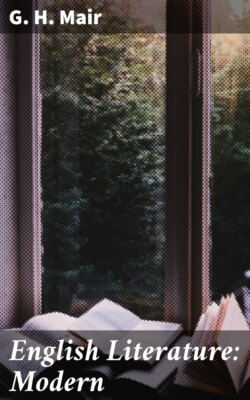Читать книгу English Literature: Modern - G. H. Mair - Страница 11
На сайте Литреса книга снята с продажи.
(1)
ОглавлениеTo understand Elizabethan literature it is necessary to remember that the social status it enjoyed was far different from that of literature in our own day. The splendours of the Medicis in Italy had set up an ideal of courtliness, in which letters formed an integral and indispensable part. For the Renaissance, the man of letters was only one aspect of the gentleman, and the true gentleman, as books so early and late respectively as Castiglione's Courtier and Peacham's Complete Gentleman show, numbered poetry as a necessary part of his accomplishments. In England special circumstances intensified this tendency of the time. The queen was unmarried: she was the first single woman to wear the English crown, and her vanity made her value the devotion of the men about her as something more intimate than mere loyalty or patriotism. She loved personal homage, particularly the homage of half-amatory eulogy in prose and verse. It followed that the ambition of every courtier was to be an author, and of every author to be a courtier; in fact, outside the drama, which was almost the only popular writing at the time, every author was in a greater or less degree attached to the court. If they were not enjoying its favours they were pleading for them, mingling high and fantastic compliment with bitter reproaches and a tale of misery. And consequently both the poetry and the prose of the time are restricted in their scope and temper to the artificial and romantic, to high-flown eloquence, to the celebration of love and devotion, or to the inculcation of those courtly virtues and accomplishments which composed the perfect pattern of a gentleman. Not that there was not both poetry and prose written outside this charmed circle. The pamphleteers and chroniclers, Dekker and Nash, Holinshed and Harrison and Stow, were setting down their histories and descriptions, and penning those detailed and realistic indictments of the follies and extravagances of fashion, which together with the comedies have enabled us to picture accurately the England and especially the London of Elizabeth's reign. There was fine poetry written by Marlowe and Chapman as well as by Sidney and Spenser, but the court was still the main centre of literary endeavour, and the main incitement to literary fame and success.
But whether an author was a courtier or a Londoner living by his wits, writing was never the main business of his life: all the writers of the time were in one way or another men of action and affairs. As late as Milton it is probably true to say that writing was in the case even of the greatest an avocation, something indulged in at leisure outside a man's main business. All the Elizabethan authors had crowded and various careers. Of Sir Philip Sidney his earliest biographer says, "The truth is his end was not writing, even while he wrote, but both his wit and understanding bent upon his heart to make himself and others not in words or opinion but in life and action good and great." Ben Jonson was in turn a soldier, a poet, a bricklayer, an actor, and ultimately the first poet laureate. Lodge, after leaving Oxford, passed through the various professions of soldiering, medicine, playwriting, and fiction, and he wrote his novel Rosalind, on which Shakespeare based As You Like It while he was sailing on a piratical venture on the Spanish Main. This connection between life and action affected as we have seen the tone and quality of Elizabethan writing. "All the distinguished writers of the period," says Thoreau, "possess a greater vigour and naturalness than the more modern … you have constantly the warrant of life and experience in what you read. The little that is said is eked out by implication of the much that was done." In another passage the same writer explains the strength and fineness of the writings of Sir Walter Raleigh by this very test of action, "The word which is best said came nearest to not being spoken at all, for it is cousin to a deed which the speaker could have better done. Nay almost it must have taken the place of a deed by some urgent necessity, even by some misfortune, so that the truest writer will be some captive knight after all." This bond between literature and action explains more than the writings of the voyagers or the pamphlets of men who lived in London by what they could make of their fellows. Literature has always a two-fold relation to life as it is lived. It is both a mirror and an escape: in our own day the stirring romances of Stevenson, the full-blooded and vigorous life which beats through the pages of Mr. Kipling, the conscious brutalism of such writers as Mr. Conrad and Mr. Hewlett, the plays of J.M. Synge, occupied with the vigorous and coarse-grained life of tinkers and peasants, are all in their separate ways a reaction against an age in which the overwhelming majority of men and women have sedentary pursuits. Just in the same way the Elizabethan who passed his commonly short and crowded life in an atmosphere of throat-cutting and powder and shot, and in a time when affairs of state were more momentous for the future of the nation than they have ever been since, needed his escape from the things which pressed in upon him every day. So grew the vogue and popularity of pastoral poetry and of pastoral romance.
